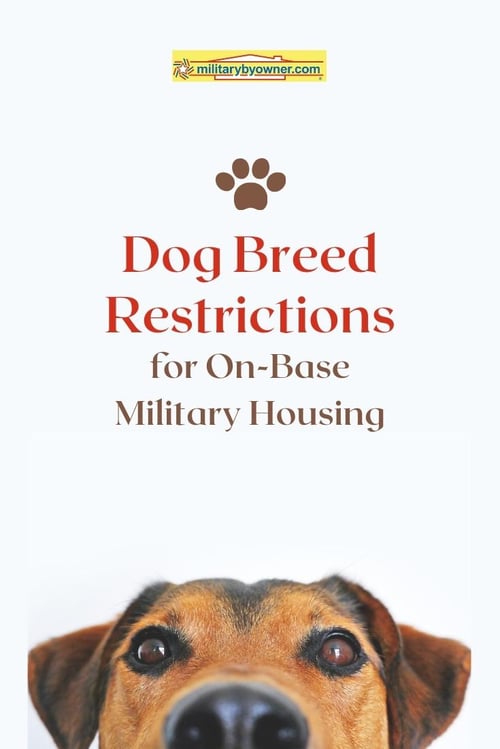Dog Breed Restrictions for On-Base Military Housing
If you're moving into military housing, you probably have questions about whether or not your family's beloved dog is allowed. Privatized base housing companies have created their own policies regarding banned breeds, but they’re also intertwined with official military installation policies across the branches.
This is confusing for new residents because the language sometimes differs. Not only are the breed restrictions different, but the number of pets allowed in a home changes from base to base and company to company. Add to that the fact that some of these breeds have the potential to be certified as assistance animals, and the policies and possibilities for a waiver become even more challenging to navigate.
The History of Banned Breeds and Military Housing
Rules banning specific dog breeds in base housing started in 2008-2009. It’s commonly thought that bans were put in place after two significant events. The first was an uptick in dog bites and attacks on military families living on base. The second was the full implementation of privatized housing, which had to accommodate safety regulations to obtain insurance.
 Photo by alberto clemares expósito from Getty Images via Canva.com
Photo by alberto clemares expósito from Getty Images via Canva.com
Lists of restricted dog breeds on military bases, compiled from housing companies, include:
- American Pit Bull Terrier
- Staffordshire Bull Terrier
- Bull Mastiff
- Rottweiler
- Doberman Pinscher
- Akita
- Rhodesian Ridgeback
- Chow Chow
- Wolf Breeds
- Cross of any of the above
- Any dog that demonstrates a propensity for aggressive or dominant behavior
Note that this isn’t an exhaustive list, as each base and housing company has its own policies, but these breeds are typically singled out. When searching for housing companies to obtain specific information on their banned breed lists, it is often necessary to contact their offices directly.
Corvias Property Management is an exception; see an example of their pet policy from Fort Meade, Maryland.
Understanding Military Housing Pet Policies (and Some Points of Contention)
Military families who own banned breed dogs and prefer to live on base have, for years, been vocal about what they perceive as unfair prejudice against the breeds, and in response, place the blame on bad owners for aggressive behaviors. However, even with significant publicity and organized petitions, these baseline bans remain. If you happen to be in the Coast Guard, its policy is an exception and does not ban any dog breed.
Coast Guard Pet Policy
The Coast Guard policy doesn't outright ban specific breeds but states,
"Dogs will not be prohibited from housing based on breed, but may be removed by the LHA for demonstrated instances of aggressive behavior such as unprovoked barking, growling, or snarling at people approaching the animal, aggressively running along fence lines when people are present, biting or scratching people, and escaping confinement or restriction to chase people."
Air Force Standardized Pet Policy
"Residents may not board dogs of any breed (including a mixed breed) that are deemed a'ggressive or potentially aggressive,' unless the dog is a certified military working dog that is being boarded by its handler/trainer or approval is obtained by the Installation Commander in writing. For purposes of this policy, aggressive or potentially aggressive breeds of dogs are defined as a Pit Bull (American Staffordshire Bull Terrier or English Staffordshire Bull Terrier), Rottweiler, Doberman Pinscher, Chow and wolf hybrids.”
Army Policy - Domestic Animals on Army Installations
"Residents, employees, contractors, or visitors may not bring on any installation, any dog of a breed (including a mixed breed) that is deemed aggressive/dangerous or potentially aggressive/dangerous. For purposes of this policy, aggressive/dangerous or potentially aggressive/dangerous breeds of dogs are defined as Pit Bulls (American Staffordshire Bull Terriers or English Staffordshire Bull Terriers), Rottweilers, Doberman Pinschers, Chows, and wolf hybrids.
This prohibition also extends to other dogs that demonstrate a propensity for dominant or aggressive/dangerous behavior as indicated by any of the following types of conduct:
(a) Unprovoked barking, growling, or snarling when people are present.
(b) Aggressively running along fence lines when people are present.
(c) Biting or scratching people, or attacking other pets.
(d) Escaping confinement or restriction to chase people."
Navy Housing Pet Policy
In general, the Navy gives way to privatized housing providers to decide which breeds are banned from its housing. Policies vary by base and housing company. Reach out to the company that operates housing on the base you’re considering for the most up-to-date information.
Marine Corps Pet Policy
The Marine Corps policy is similar to the Navy's. See this example from Twenty-Nine Palms Base Housing:
"Pit Bulls (American Pit Bull Terrier, American Staffordshire Terrier, Staffordshire Bull Terrier), Rottweilers, any Wolf hybrid or any mix of the aforementioned breeds are not permitted in family housing or aboard the base."
 Photo by Kurt Pas from Getty Images via Canva.com
Photo by Kurt Pas from Getty Images via Canva.com
Mixed Breed Dogs in Military Housing
Another source of contention among banned breed owners is the official designation of mixed breeds. There is room for interpretation from veterinarians on how exactly to label a dog with lineage from a restricted breed. Increasingly, officials require a dog DNA test to prove the dog’s breed, but banned breed advocates also contest these results since they have plenty of room for error, and owners question the percentage of a restricted breed bloodline that is deemed too high.
Although a mixed puppy may have Staffordshire Bull Terrier heritage, it could easily have other breed lines, such as the very docile Labrador Retriever. Which breed should the veterinarian document? Sometimes, simple paperwork from a professional makes all the difference in the ability to live on base.
Housing offices use either the breed name listed on your pet’s vet records or DNA results. Again, verification varies from base to base. For example, housing on MCB Quantico requires one of the two options and will not accept non-specific breed words such as "mixed" or "mutt" from the vet.
Related: Is Your Exotic Pet Allowed in Military Housing? No, your monkey can’t live on base!
Housing Options for Military Families Who Own a Banned Dog Breed
1. Find a rental home off base.
One option many military families choose is to rent a home off base. However, renting sometimes poses its own set of roadblocks because many commercial rental communities and HOA-restricted neighborhoods prohibit the same breeds as the local base housing office.
There are accommodating homeowners out there who have experience owning a banned breed and may understand the challenges of a renter who happens to have a heart for dogs that are traditionally labeled as aggressive.
A real estate agent with experience in the rental market might have the inside scoop on pet-friendly rentals. It's also a great idea to have a letter from a former property owner who can vouch on your behalf about the behavior of your dog.
Learn more: Should Renters Have a Pet Resume?
 Photo by LumiNola from Getty Images Signature via Canva.com
Photo by LumiNola from Getty Images Signature via Canva.com
2. Buy a home.
When all else fails in a rental search, many military families choose to buy a home so they can accommodate the needs of their furry family members. As with rentals, breed restrictions may still exist in HOA neighborhoods, but buying a home may free you from pet ban restrictions.
To help you better identify a pet-friendly home near your new base that has fenced and spacious yards, a pro real estate agent can help you quickly identify a house that best fits your needs.
3. Consider temporary care for your pet.
While this option is a last resort, as well as heartbreaking for families who see their dog as a member of the family, should your family need to live on base or be moving overseas, where the only option is living in military housing, you might need to consider a temporary alternative home for your pet.
You may ask trusted friends or family members to care for your dog while you live on base or explore some reputable online resources for foster pet care. The same is true for dog breed-specific rescues.
Some options to explore:
More help for moving with pets: 6 Resources for a Military Move with Pets.
It doesn’t seem as though the restrictions on dog breeds allowed to live in military housing are going away anytime soon. It's a tough call to make for officials—to craft policies that consider both the public’s safety and the rights of serious dog owners willing to do the work it takes to maintain the high expectations placed on banned breeds. Considering your pet’s well-being in advance of a move will help you expand your housing options.
Did you know that the Advanced Search settings on MilitaryByOwner include a filter to list rentals that accept pets? Yep! So take a chance on one of the owners. They could be banned breed-friendly!
This blog post is regularly updated for the latest, most accurate information. This post is for informational purposes only and should not be viewed as legal advice. Check with your installation's housing office for specifics on their pet policies, including banned dog breeds.






